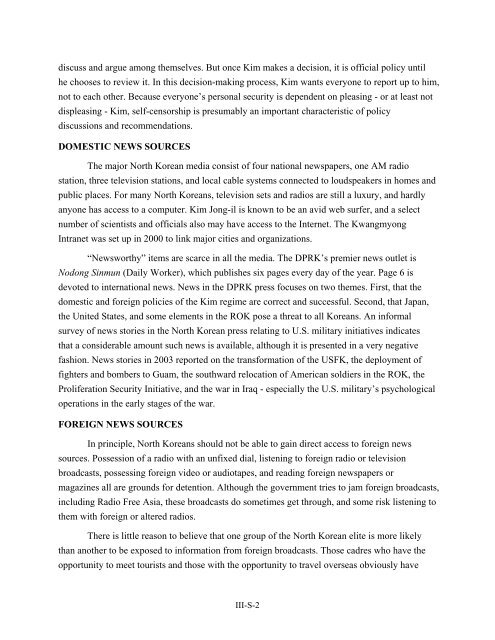North Korean Policy Elites - Defense Technical Information Center
North Korean Policy Elites - Defense Technical Information Center
North Korean Policy Elites - Defense Technical Information Center
Create successful ePaper yourself
Turn your PDF publications into a flip-book with our unique Google optimized e-Paper software.
discuss and argue among themselves. But once Kim makes a decision, it is official policy until<br />
he chooses to review it. In this decision-making process, Kim wants everyone to report up to him,<br />
not to each other. Because everyone’s personal security is dependent on pleasing - or at least not<br />
displeasing - Kim, self-censorship is presumably an important characteristic of policy<br />
discussions and recommendations.<br />
DOMESTIC NEWS SOURCES<br />
The major <strong>North</strong> <strong>Korean</strong> media consist of four national newspapers, one AM radio<br />
station, three television stations, and local cable systems connected to loudspeakers in homes and<br />
public places. For many <strong>North</strong> <strong>Korean</strong>s, television sets and radios are still a luxury, and hardly<br />
anyone has access to a computer. Kim Jong-il is known to be an avid web surfer, and a select<br />
number of scientists and officials also may have access to the Internet. The Kwangmyong<br />
Intranet was set up in 2000 to link major cities and organizations.<br />
“Newsworthy” items are scarce in all the media. The DPRK’s premier news outlet is<br />
Nodong Sinmun (Daily Worker), which publishes six pages every day of the year. Page 6 is<br />
devoted to international news. News in the DPRK press focuses on two themes. First, that the<br />
domestic and foreign policies of the Kim regime are correct and successful. Second, that Japan,<br />
the United States, and some elements in the ROK pose a threat to all <strong>Korean</strong>s. An informal<br />
survey of news stories in the <strong>North</strong> <strong>Korean</strong> press relating to U.S. military initiatives indicates<br />
that a considerable amount such news is available, although it is presented in a very negative<br />
fashion. News stories in 2003 reported on the transformation of the USFK, the deployment of<br />
fighters and bombers to Guam, the southward relocation of American soldiers in the ROK, the<br />
Proliferation Security Initiative, and the war in Iraq - especially the U.S. military’s psychological<br />
operations in the early stages of the war.<br />
FOREIGN NEWS SOURCES<br />
In principle, <strong>North</strong> <strong>Korean</strong>s should not be able to gain direct access to foreign news<br />
sources. Possession of a radio with an unfixed dial, listening to foreign radio or television<br />
broadcasts, possessing foreign video or audiotapes, and reading foreign newspapers or<br />
magazines all are grounds for detention. Although the government tries to jam foreign broadcasts,<br />
including Radio Free Asia, these broadcasts do sometimes get through, and some risk listening to<br />
them with foreign or altered radios.<br />
There is little reason to believe that one group of the <strong>North</strong> <strong>Korean</strong> elite is more likely<br />
than another to be exposed to information from foreign broadcasts. Those cadres who have the<br />
opportunity to meet tourists and those with the opportunity to travel overseas obviously have<br />
III-S-2













